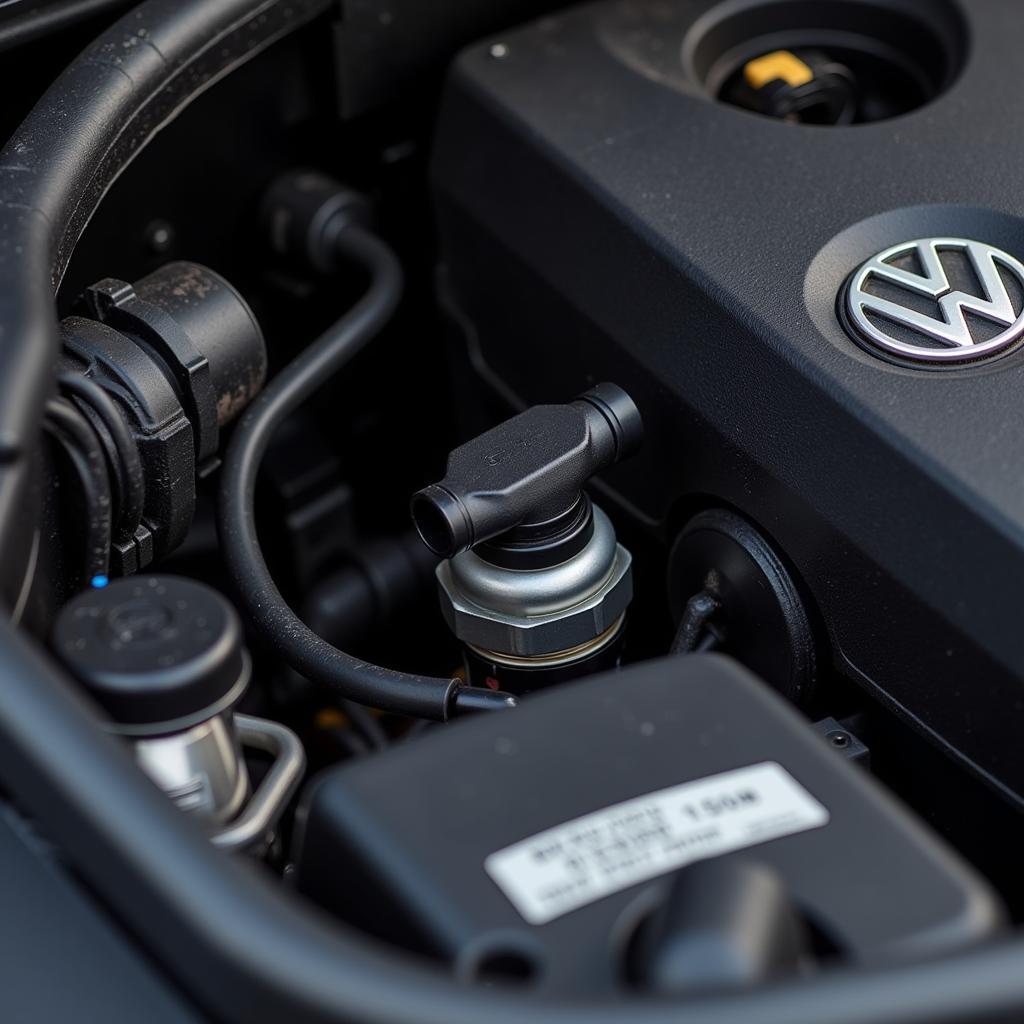Your cart is currently empty!

P0236 VW Code: Turbocharger/Supercharger Boost Sensor A Circuit Range/Performance (Ross-Tech)
The dreaded P0236 code. If you’re a Volkswagen owner, this is one code you don’t want to ignore. Specifically, a P0236 VW Ross-Tech code means there’s a problem with the boost pressure sensor “A” circuit range/performance. But what does that actually mean and, more importantly, what can you do about it?
This comprehensive guide will explore everything you need to know about the P0236 code in your Volkswagen. We’ll cover the common symptoms, potential causes, and, most importantly, provide practical solutions to get your car back on the road.
Understanding the P0236 VW Code
Your car’s Engine Control Module (ECM) is like its brain. It uses various sensors to monitor and adjust engine performance. One crucial sensor is the manifold absolute pressure (MAP) sensor, which measures the pressure inside the intake manifold. This information helps the ECM determine the boost pressure generated by the turbocharger or supercharger.
When your Volkswagen displays the P0236 code, it indicates an issue with the boost pressure sensor “A” circuit or its signal. This essentially means the ECM is receiving incorrect or erratic readings from the sensor, hindering its ability to manage boost pressure effectively.
 VW boost sensor
VW boost sensor
Symptoms of a P0236 VW Code
Recognizing the symptoms can help you catch the problem early. Here are some common signs of a P0236 code in your Volkswagen:
- Check Engine Light: The most obvious symptom is the illumination of the check engine light on your dashboard.
- Reduced Engine Power: You might notice a significant decrease in your engine’s power and acceleration, particularly when accelerating from a stop or climbing hills.
- Limp Mode: In severe cases, your Volkswagen might enter “limp mode” as a safety precaution. This severely restricts engine power to prevent potential damage.
- Unusual Engine Noises: A hissing or whistling sound coming from the engine bay, particularly during acceleration, could indicate a boost leak, a common contributor to the P0236 code.
- Black Smoke from Exhaust: Black smoke coming from your car’s exhaust, particularly under acceleration, suggests a rich fuel mixture, which can also be triggered by incorrect boost pressure readings.
Common Causes of a P0236 Code
Many factors can trigger the P0236 code in Volkswagen vehicles. Here are some of the most prevalent culprits:
Faulty Boost Pressure Sensor
The most common cause is a faulty boost pressure sensor itself. Like any sensor, it can wear out or malfunction over time, sending inaccurate readings to the ECM.
Vacuum Leaks
Vacuum leaks in the intake manifold or related hoses can disrupt the pressure readings, leading to a P0236 code.
Wiring Issues
Damaged, corroded, or loose wiring connections between the boost pressure sensor and the ECM can disrupt the signal transmission, causing erratic readings.
Faulty Turbocharger/Supercharger
While less common, a malfunctioning turbocharger or supercharger itself can also trigger the P0236 code.
Diagnosing the P0236 Code Using Ross-Tech
Ross-Tech’s VCDS (Vag-Com Diagnostic System) is a powerful diagnostic tool specifically designed for Volkswagen Audi Group (VAG) vehicles. It allows for in-depth analysis of your car’s systems, including the boost pressure sensor circuit.
Here’s how to diagnose the P0236 code using Ross-Tech:
- Connect VCDS: Connect your VCDS interface to your Volkswagen’s OBD-II port, usually located under the dashboard on the driver’s side.
- Run a Scan: Turn on the ignition and launch the VCDS software on your computer. Select the correct model and year of your Volkswagen, and initiate a scan for fault codes.
- Identify P0236: Look for the P0236 code in the scan results.
- Check Measuring Blocks: Access the “Measuring Blocks” function within VCDS and select the appropriate block group for the boost pressure sensor. This allows you to monitor live data from the sensor, revealing potential inconsistencies or erratic readings.
- Perform Output Tests: VCDS allows you to perform output tests on various components, including the N75 valve, which controls boost pressure. This helps pinpoint whether the issue lies with the sensor or related components.
Fixing the P0236 VW Code
Addressing the P0236 code often involves a systematic approach to identify and rectify the root cause:
1. Inspect Vacuum Lines
Carefully inspect all vacuum lines connected to the intake manifold, boost pressure sensor, and related components for any signs of cracks, leaks, or loose connections. Replace any damaged or suspect hoses.
2. Check Wiring and Connections
Thoroughly examine the wiring harness connected to the boost pressure sensor for any damage, corrosion, or loose connections. Repair or replace any faulty wiring.
3. Test and Replace Boost Pressure Sensor
If the vacuum lines and wiring appear to be in good condition, the boost pressure sensor is the likely culprit. You can test the sensor using a multimeter or simply replace it, as they are relatively inexpensive.
4. Inspect Turbocharger/Supercharger (If Necessary)
If the P0236 code persists after addressing other potential causes, it might indicate a problem with the turbocharger or supercharger itself. A qualified mechanic should inspect these components for any faults.
Conclusion
The P0236 VW code might seem daunting, but understanding its meaning and potential causes empowers you to address it effectively. By utilizing the diagnostic capabilities of Ross-Tech’s VCDS and following the troubleshooting steps outlined above, you can pinpoint the root cause and take the necessary steps to restore your Volkswagen’s performance.
If you’re uncomfortable diagnosing or fixing the problem yourself, seeking help from a qualified Volkswagen mechanic is always recommended.
For further assistance with your Volkswagen’s P0236 code or other automotive needs, don’t hesitate to contact VCDStool at +1 (641) 206-8880 and our email address: vcdstool@gmail.com or visit our office at 6719 W 70th Ave, Arvada, CO 80003, USA. Our team of experts is dedicated to providing top-notch support and solutions for all your automotive needs.
by
Tags:
Leave a Reply